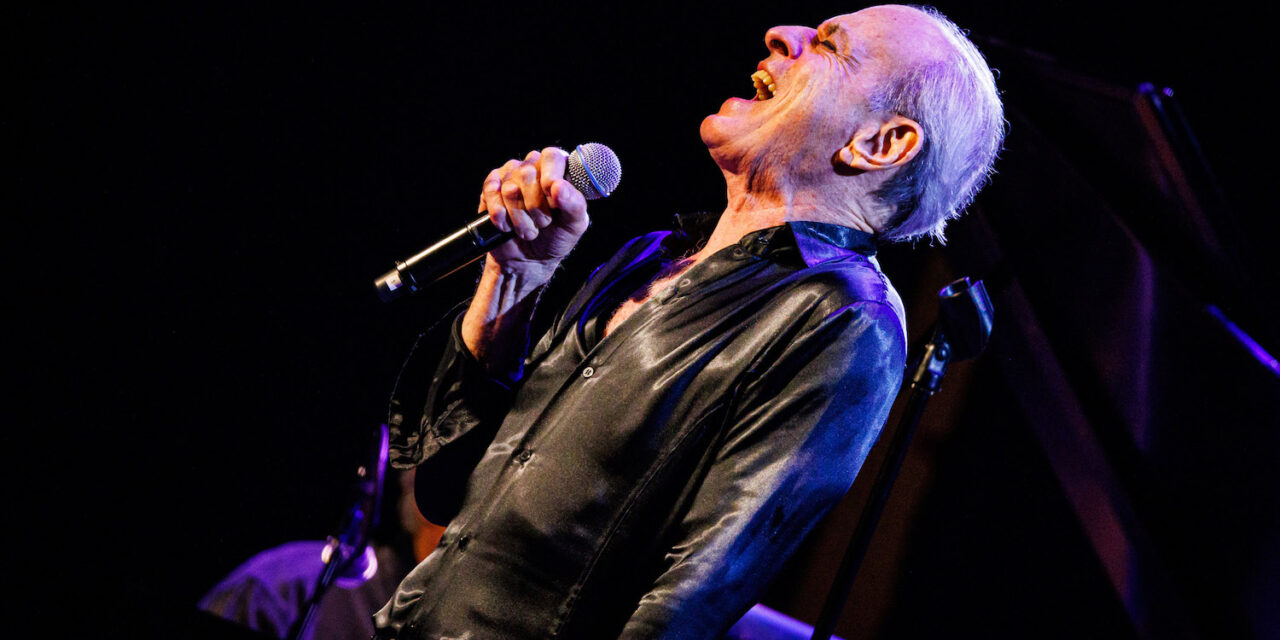By Ron Fassler . . .
For fans of Ney Matogrosso who flocked to see him at the Town Hall on April 21, there was little chance for disappointment. Early on, they rushed the stage determined to get a piece of the Brazilian icon, whose groundbreaking sexual intensity has charged the international music scene for decades. Still going strong at eighty-one years old, Matogrosso has no intention of slowing down or denying his followers the chance to see and hear him live.
In a rare New York City concert, the physically fit Matogrosso still has a body to make younger men jealous. His sinewy form, once bedecked in outfits and outrageous makeup that pre-dated Gene Simmons and KISS and Alice Cooper, is still very much intact. And though this may have been a mellower version of his renegade self, he is assuredly no less passionate about his music. Accompanied by Grand Master Pianist Leandro Braga, from the moment Matogrosso stepped onto the stage, members of the audience made a dash to get closer and flatter him as if he were a God. Not a real God, no. But a God of Brazilian music? Yes.

Ney de Souza Pereira was born in 1941 in the Brazilian state of Mato Grosso do Sul. Flamboyant and gifted with a high tenor voice from a young age, he left home while still a teenager (his flamboyance angered his father, a military man). Eventually finding his way to São Paulo, he met fellow musician João Ricardo and together they became part of Secos & Molhados, a glam-rock trio. Part of their legend is that João came up with the group’s name after spying a sign he’d seen (Secos & Molhados, that translates to Dry Goods and Wet Goods), which seemed to fit their burgeoning attitude of sexual fluidity.
This is when Ney changed his last name to honor that of his hometown. By the early 1970s, Matogrosso’s sexually conspicuous persona was designed to show off his true self. Famously, during one São Paulo concert show in 1972, cries of “Faggot, Faggot!” defiantly rose up from the crowd. With his face painted in a mask-like Kabuki-style, Matogrosso took on the jeers by shouting back, “Vão tomar no cu!” (“Go take it in the ass!”).
A star was born.


From his very first song at Town Hall Friday night, “Nada por mim” composed by Herbert Vianna and Paula Toller, it was clear that those in attendance were getting exactly what they came for. Song after song was met with the same love passed back and forth between the singer and his audience. Midway through the concert, Mariza, one of the most popular Portuguese fado singers, joined Matogrosso on stage. Humbly, she informed the gathering that “we were in front of the biggest singer in music history.” The compliment made Matogrosso smile and blush. Their mutual affection made it appear during their two songs that they have been singing together for years.
Before the one-hour concert ended, Matogrosso sang the popular “Poema.” Its backstory is that it was written by Cazuza, another Brazilian rock star and Matogrosso’s former partner, as an ode to his grandmother. After Cazuza’s death from AIDS, the poem was found and given to Matogrosso by Cazuza’s mother to turn into a song. Matogrosso’s personalized rendition was among the most moving of the evening.
But it was “Rosa de Hiroshima,” a poem written by one the geniuses of the Bossa Nova, Vinícios de Morais and set to song, that produced the biggest ovation all night. Written in protest of the atomic bomb explosions in Nagasaki during World World II, its resonance in a no-less violent world today rocked the Town Hall.
Personally, it was when Matogrosso leaned against the piano, once again relying upon the superb accompaniment of Leandro Braga, that his singing of composer Rita Lee’s marvelous “Balada do Louco” rose to unexpected heights. Here he brought his voice to another level, its last lyric gaining unexpected significance: “Mas louco é quem me diz, E não é feliz, eu sou feliz,” which translates to “But crazy is anyone who tells me I’m not happy, I’m happy”.
Happy were those fortunate to see Ney Matogrosso. Happy indeed.
Photos by Sachyn Mital


















